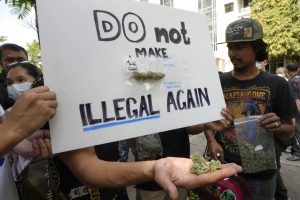Back in June, when Thailand became the first nation in Southeast Asia to legalize marijuana, legalization advocates celebrated the move as a step forward for personal freedom – and a rare glimmer of rationality in a region known for its draconian drug laws. But five months later, they have taken to the streets to protest a growing push by conservatives to re-list cannabis as a narcotic.
On Tuesday, around 200 protesters, some wearing T-shirts emblazoned with marijuana leaf motifs, rallied at Government House in Bangkok to protest the possible rollback of the drug’s recent decriminalization. As The Associated Press reported, “Tuesday’s rally brought together cannabis farmers and shop owners who stand to lose out financially, as well as smokers who want to enjoy marijuana without harassment.”
“There is a very high chance that cannabis may end up being illegal again, so it’s quite a very high stake right now,” Chokwan Chopaka of the People’s Network for Cannabis Legislation in Thailand, which organized the event, told Voice of America.
Earlier this year, Thailand removed cannabis from its list of Category 5 narcotics, which also includes opium, and in June, it became the first nation in Southeast Asia to legalize the drug’s cultivation for medical and culinary uses. But the step, which was spearheaded by Public Health Minister Anutin Charnvirakul, was taken without putting in place a law to regulate the use of cannabis – specifically, the conditions around its cultivation and sale.
In this vacuum of regulation has emerged a booming recreational marijuana industry. Across the country, hundreds of cannabis shops have sprung up, including mobile dispensaries and street stalls, selling myriad strains of marijuana, as well as pre-rolled joints and weed-infused gummies.
As VICE News noted in an article last month, the liberalization, which coincided with Thailand’s post-COVID-19 economic opening and the return of international tourism, “has seen cannabis businesses sprout across the country, eager to join the green rush.”
The sudden proliferation of such businesses, the apparent (though likely exaggerated) boom in marijuana use among teenagers, and breathless media reports about young people being hospitalized after consuming marijuana edibles, have sparked a backlash from some conservatives. Many are now calling for tougher restrictions – even for marijuana to be reinstalled on the list of banned narcotics.
In a move to ease the pressure, the authorities have introduced several piecemeal regulations clarifying that cannabis cannot be sold to children or near schools and temples and setting strict limits on how much THC – the plant’s active ingredient – that foods and medicines can contain. A more comprehensive Cannabis Control Bill that would govern the cultivation, sale, and consumption of marijuana was also tabled in parliament yesterday, though the lack of a quorum prevented any debate on the law.
But the legislation is not certain to pass, with opposition parties, and even some officials from within Prime Minister Prayut Chan-o-cha’s ruling coalition, arguing that cannabis should be placed back on the list of scheduled narcotics until a more robust legal framework is established.
On November 21, the AP reported, Thailand’s Administrative Court accepted a lawsuit filed by a doctor and opposition lawmakers against Anutin and the Narcotics Control Board, which is seeking to reverse Anutin’s original order and to effectively recriminalize marijuana. “It was wrong to not have governing laws before unlocking cannabis … it is not being used medically, but recreationally,” Smith Srisont, the president of Thailand’s association of forensic physicians, told reporters, according to Reuters.
The current stand-off illustrates the division between the country’s recreational marijuana users and pro-legalization advocates and Anutin, the man who did the most to legalize the drug. A member of the Bhumjaithai Party, which is part of Prime Minister Prayut’s ruling coalition, Anutin’s agenda was less to legalize the recreational use of marijuana than to promote the plant’s medicinal use and to generate a commercial industry around serving this medical demand. Farmers are an important constituency for the Bhumjaithai Party, whose support it hopes to cultivate (so to speak) ahead of elections due next year.
While Anutin has defended his policy and ruled out recriminalizing marijuana, there is a chance that neither he nor his party will be in a position to make these decisions after the country’s next election, due to be held by May 2023. Given the vocal opposition, and the ham-fisted way in which that liberalization has proceeded so far, Thailand’s pioneering push could well end up being a false dawn for Asian drug liberalization.

































